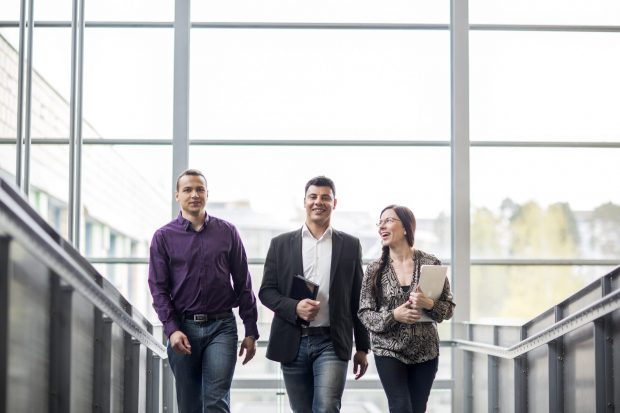“Tell me and I forget, teach me and I may remember, involve me and I learn.”
― Benjamin Franklin
Expertise today and in the future is all about continuously learning, sharing and interacting with others (3). This applies to all professional stages – from juniors to seniors. Mentoring programs, currently popular and numerous, are founded on the same idea of enabling networks and developing competences in interaction. This is particularly invaluable for international graduates. In our case, this spring with the COVID-19 pandemic gave us a unique chance to experience a virtual learning journey together, as a mentor and a mentee.
Daniel’s perspective: networks, insight and improved competences for the mentee
For international graduates in Finland, besides Finnish language skills, networks and knowledge of the local professional practices are immensely important for finding a job (4, 5). I joined the EntryPoint programme as a mentee because I have an extensive education from this country in the fields of business and education, yet no expert level experience so far. I therefore felt I needed some guidance from an experienced professional and decided to take action to improve my employability.
The discussions with my mentor Marika helped me better understand the local job market, my options for a career path and ways to develop my self-preparedness. Marika connected me to a whole new range of networks and services and helped me identify my utmost competences and skills. I discovered the connections between my skill sets and how to integrate them in my career path. The experience was eye-opening.
Marika’s perspective: diversified professional perspectives and new views for the mentor
Mentoring is a learning experience also for the mentor (2). My day job at Metropolia focuses on international talents’ employability, yet also on the personal level the topic motivates me and I am always interested in learning new. I therefore wanted to volunteer as a career mentor and share my professional experiences and insights as a private person as well.
The experience opened new views for me not just to myself, but also to employability, the education sector, Finland, professionalism and human interaction. The mentoring discussions made me think about organisational learning as well, so crucial for any organisation today (see e.g. 2). I realised that we can all do mini-scale mentoring in any encounter in an expert organisation. Moreover, for internationalising organisations, cross-cultural mentoring could definitely be used as a tool to develop staff competences for both mentors and mentees.
Leap to digital: surprisingly effortless and efficient
Our five-month mentoring program started in January 2020 and took an unexpected turn in March with the COVID-19 pandemic forcing us to adjust to virtual meetings. Luckily, we had met face-to-face once before, immediately establishing a rapport based on a combination of friendship and professional support. Shared professional and personal interests, such as helping others and teaching, made it natural for us.
As first-timers in career mentoring, going suddenly digital meant stepping out of our comfort zone. Mentoring is based on openness, trust and confidentiality, which in a virtual environment requires a different type of a focus on the process and the choice of tools. The communication needs to be structured and goals clear particularly when using social media. (1.)
We ended up using WhatsApp messages and video calls and also shared material in LinkedIn. Using such common social media made the communication surprisingly effortless and quickly more informal than perhaps in a face-to-face setting. The uniqueness of the crisis situation also brought us closer together on a personal level. However, we did have a structure of working together as well: we set goals and topics for each video call, whereas messages were used for updates, follow-up and building a rapport.
The organiser of the program, Helsinki Region Chamber of Commerce, also arranged joint Zoom meetings for mentees and mentors for sharing experiences. These were not only fun but also supported the process and gave us new perspectives to what we were doing. Mentors also met in virtual peer sessions which helped us mentors face the new normal and brought in even more professional networks for us. We both learned new ways of communicating and the experience actually also motivated Daniel to write a PhD research proposal on remote working.
Mentoring as a tool for international students’ career development
80% of Finnish employers say that they are open to multiculturality (5), yet the employment rates of international graduates from Finnish higher education institutions are significantly lower than those of locals (6). Employers need to start opening doors to international talents. Moreover, higher education institutions and Finnish society at large need to rethink their support for employability to get more talents to work in Finland. (4.)
Mentoring provides an excellent and natural way to tackle the employment challenges. For instance, it provides networks and field-specific tacit information, develops professional competences and at the same time empowers the mentee through positive feedback (2). These are important for any junior expert, yet even more so for international graduates who struggle with the lack of local working life connections as well as with sometimes rather discouraging job search experiences.
Activeness and action needed to build a successful career
Just like in any competitive career building, the success of a mentoring process is dependent on the international student’s activeness – it is their career after all. The mentee needs to be open about their goals and needs, as the process is always unique to each mentoring relationship (2). The most important step is the first one: to grasp the chances available.
In the Helsinki region plenty of opportunities are available for different needs, for example:
- EntryPoint mentoring by Helsinki Region Chamber of Commerce (in English)
- FIKA mentoring program and networking program Dörren by Luckan Integration (in English)
- Womento mentoring for educated women by the Family Federation of Finland (in English)
- Suomen Mentorit mentoring by the association Suomen Mentorit ry (in Finnish)
- Yrittäjien Mentorisi.fi mentoring for entrepreneurs by the Finnish federation of entrepreneurs Suomen Yrittäjät (page in Fnnish but the search and mentoring are available in English)
- NewCo Helsinki mentoring services for start-ups by NewCo Helsinki (in English)
- Several higher education institutions also have their own mentoring programs for students and alumni
Mentee – take your first step towards goal-oriented career building!
Mentor – why not use your professional expertise for helping somebody get started in their career?
Organisations – encourage your employees to share and develop their expertise and build networks with talented graduates!
The EntryPoint mentoring program is part of the AIKO Talent Boost project activities of the Helsinki Region Chamber of Commerce, funded through the Council of Tampere Region. Metropolia University of Applied Sciences is one of the project partners. The program for autumn semester is open for applications until 31 August 2020.
Writers:
Daniel Boateng is a qualified teacher and holds an MSc in Business and Health. He lives in Finland.
Marika Antikainen is a project manager working in SIMHE-Metropolia.
Sources:
1. Ala-Tommola, Sirpa (toim.) 2017. Jokainen opiskelija ansaitsee eMentorin! eMentoroinnin kehittäminen ammattikorkeakouluopintojen ja työelämän rajapinnassa. Kajaanin ammattikorkeakoulun julkaisusarja B 78 / 2017. Viewed on 3 June 2020.
2. Karjalainen, Merja 2010. Ammattilaisten käsityksiä mentoroinnista työpaikalla. Jyväskylä Studies on Education, Psychology and Social Research 388. Jyväskylän yliopisto. Viewed on 2 June 2020.
3. OECD 2019. OECD Future of Education and Skills 2030: Conceptual learning framework – Skills for 2030. Viewed on 1 June 2020.
4. OKM 2019. Kansainvälisten korkeakouluopiskelijoiden maahantulo ja integroituminen sujuvaksi yhteistyöllä. Opetus- ja kulttuuriministeriön julkaisuja 2019:31. Published on 16 September 2019. Viewed on 2 June 2020.
5. Taloustutkimus Oy. 2020. Kotona Suomessa – Selvitys maahanmuuttajien rekrytoimisesta: Tutkimusraportti (pdf). Kotona Suomessa -hanke, Elinkeino-, liikenne- ja ympäristökeskus. Published on 15 May 2020. Viewed on 2 June 2020.
6. Vipunen 2020. Education Statistics Finland: Placement after Graduation. Viewed on 2 June 2020.











1 Comment
My name is Aziz, an engineer with a business and entrepreneurship enthusiasm, I’m driven by new exciting ideas in the field of micro-mobility and smart innovations and modern strategies in real estate management which is also now my master’s studies field at metropolia university.